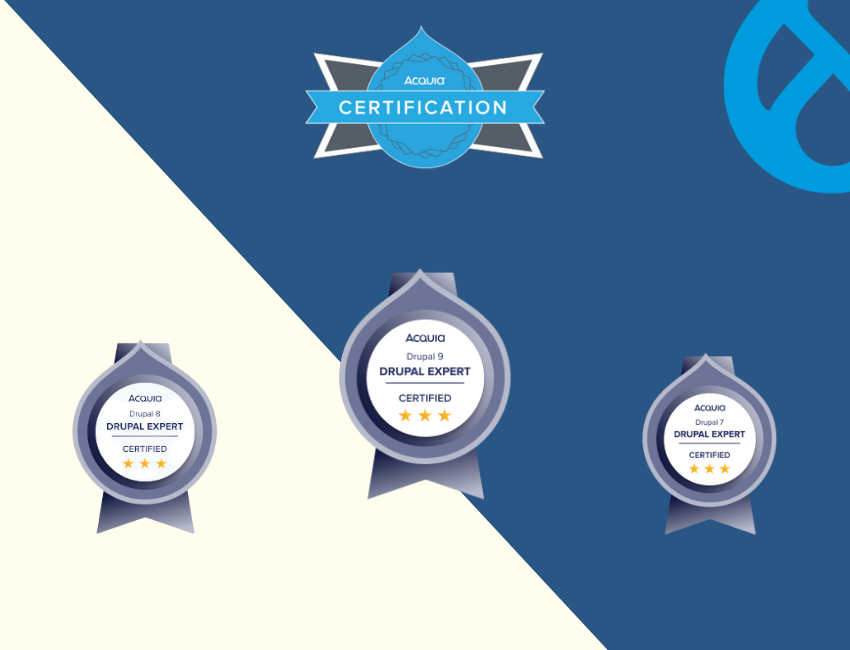Congratulations to Agileana's New Acquia Triple Certified Drupal Experts

We’re excited to announce that Agileana technical architect Gordon Makely is now a triple certified Drupal 9 expert. This is in addition to Gordon’s D7 and D8 Drupal triple expert certifications. (Yes, he's a triple-triple certified Drupal expert!)
Drupal developer Ivan Duarte is also Drupal 9 triple certified expert, while Agileana’s Sergio Sanchez is a D8 triple certified expert.
All three developers are critical to Agileana’s work developing and migrating Drupal sites for the federal government and member organizations.
The Acquia triple expert certification is awarded to developers who show proficiency in Drupal by completing three tests: the general test, front end specialist test, and backend specialist test. The certification is administered by Acquia, a Drupal cloud hosting service run by Dries Buytaert, the founder of Drupal.

D8 Triple Certified Drupal Expert

D7, D8, D9 Triple Certified Drupal Expert

D9 Triple Certified Drupal Expert
Below is a short interview with Gordon about his triple Drupal triple certification (D7, D8, and D9 triple certifications) and what it means for the work he does:
The Acquia certification is intended to show that you have an understanding best practice for developing on the Drupal platform. Why are best practices in Drupal important?
Acquia came up with the certification program to separate the wheat from the chaff to use an old school analogy. Back in the day, there were a lot of people out there doing things that were just crazy at times. There were people doing SQL injection on a template, which was just like, wow, that's not good.
So, best practices really come out of security and performance. These are the two of the biggest things you want to be concerned about on a Drupal site. The certification tests themselves are filled with multiple choice questions that may have some incorrect answers or may propose all correct answer, but they really want the best way to go about this. Because, in Drupal there’s any number of ways to do something. But you really want the best way or the most appropriate way because it’s either going to cause a security risk or performance hit if you don’t follow best practices.
You’re a Drupal 7 and Drupal 9 expert. This year D7 retires and site owners in D7 must move to D9 if they want to stay with Drupal. D7 is very different from D9, which is part of the reason that move is so daunting. Did you have any revelations about the difference between the two versions while getting your certifications?
I think the aha moments were when I would read a question during the D9 certification and one of the examples had to do with extending a class or something like that. I’d be like, oh man, that’s such a great idea because we couldn’t do that in D7.
In certain ways D7 seems like, maybe not the stone age, but maybe the bronze age. The step forward is making object oriented almost everywhere – it’s not quite, but it is really close. Twig, the templating system, is huge. Life is so good. I remember taking the D7 test and D9 is so much better. Like, how did we ever survive without it?
What would you tell D7 site owners embarking on a migration?
I’d use the carrot and the stick analogy.
Now, the carrot is, even if you’re just a content admin, like you’re a site owner who may not know the first thing about code, you’re going to like the admin interface. Because even the admin interface is responsive. I don’t know how many times back in the D7 days somebody would call up and say there’s something broken and you need to fix this one thing. And then trying to peer at your phone to get in on the D7 admin side and input something – ugh. To me the carrot is it’s a much better user experience even on the admin side.
Now, the stick is that there is end of life not only for D7 itself but also the stuff under the hood, the things that D7 relies on. It’s sitting on a LAMP stack. If you’re on a hosted system, those things might all get updated underneath you and break you and you don’t know about it until you know about it … and then, it’s a fire drill.
So, hopefully, that persuades people to move. To go to D7 to D9, depending on how much customization you’ve put into your site, it’s going to take longer than you think.



